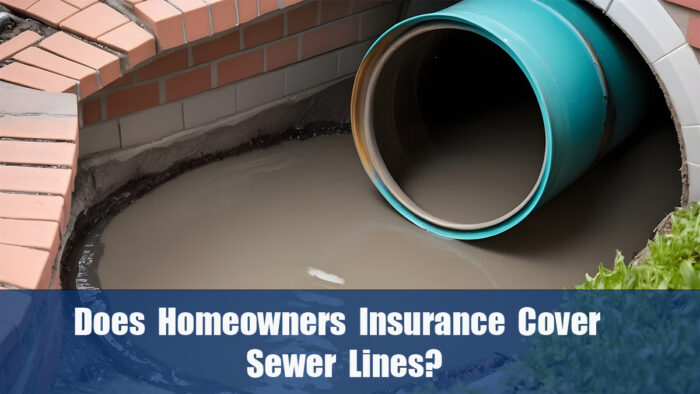Homeowners insurance usually covers your belongings and the structure of your home from a list of certain risks like fire, storm damage, and theft. However, when it comes to sewer lines, the coverage mechanism is not as straightforward as it should be. It is determined based on certain causes of the damage.

Generally, homeowners insurance may cover sewer lines if the damage was a result of a peril that is added to your quote. For example, if vandalism or a fire caused your sewer line to be damaged, it may be covered because they are threats that are usually covered by a standard home insurance policy.
When Does Homeowners Insurance Cover Sewer Lines?
Anything that is mentioned in your policy as a covered peril will be covered by your insurance company. Here are some events or incidents where your homeowner’s insurance policy may cover sewer line damage:
- Lightning
- Windstorms
- Collapse
- Falling objects.
- Volcanic eruptions.
- Fire
- Vehicle damage.
- Explosions
When Does Home Insurance Not Cover Sewer Lines?
Here are some scenarios where home insurance does not cover sewer lines:
- Tree root intrusion.
- Wear and tear.
- Sewer backups without endorsements.
- Natural ground movement.
- Negligence
- Extreme temperature.
- Deterioration and age.
- Corrosion
- Clogs
Additional Coverage for Sewer Lines
There are extra coverages and endorsements that you can add to your insurance policy. Besides, you must be aware that home insurance doesn’t cover every scenario, but with this optional coverage, you have wider coverage and protection as well. Here are a few endorsements to consider:
- Service Line Coverage: This endorsement offers coverage for underground service lines and pipes, including sewer lines, from your house to the property boundary or utility connection.
- Home Warranty: Home warranty is very different from home insurance, and it provides sewer line coverage as well. Moreover, it is a separate plan that helps homeowners protect and cover the replacement or repair costs of sewer lines.
- Sewer Backup Coverage: This type of coverage offers coverage for damage as a result of sewer backups into your home, which is not usually covered under a standard policy.
How to Prevent Damage to Your Sewer Line
If you want to save money and avoid stress when it comes to sewer lines, here are some effective tips that you can implement:
- Tree Placement: Be careful about where you plant trees to prevent root intrusion into sewer lines.
- Maintenance: Pay attention to the signs of possible problems, for instance, discovering potential issues, unfamiliar odors, and slow drains to rectify them fast.
- Regular Inspections: Make sure that a regular inspection is conducted on your sewer lines by a professional to detect potential issues early.
- Proper Disposal: Do not flush anything down the toilet that is not toilet-flush-friendly.
Understanding your home insurance policy and taking steps to protect your sewer will help you decrease the risk involved with damages and costly repairs.
Frequently Asked Questions
Can I get insurance specifically for sewer lines?
The answer is yes. Many insurance companies provide service line coverage as an endorsement, which can specifically include sewer lines. This coverage is created to protect against the cost of repairing or replacing damaged service lines that run to your home, including sewer lines.
Is sewer backup the same as sewer line coverage?
No, these are different coverages. Sewer backup coverage is an endorsement of a homeowners policy that covers damage to the home caused by a backup of sewage. It does not cover the cost of repairing the sewer line itself. Sewer line coverage or service line coverage would be needed to cover the repair or replacement of the actual sewer line.
Will my premium increase if I add sewer line coverage?
Including any additional coverage on your homeowners policy, like sewer line coverage, might cause your premium to increase. However, the cost could be relatively low, unlike the potential expense of repairing or replacing a sewer line without coverage.
How can I find out if my homeowners insurance includes sewer line coverage?
The best way to understand your coverage is to review your insurance policy or speak directly with your insurance agent. Look for sections on service line coverage or endorsements that might include sewer lines, and don’t hesitate to ask for clarification on any points.



